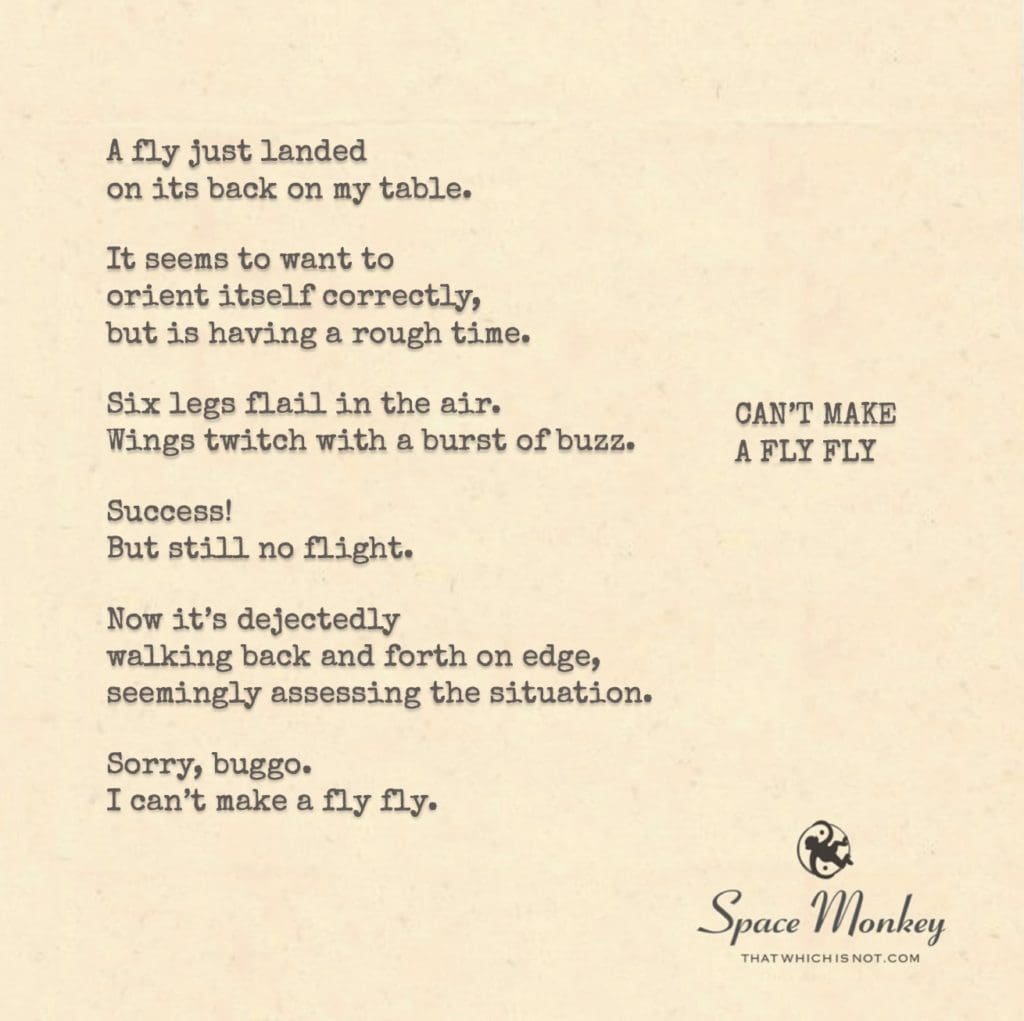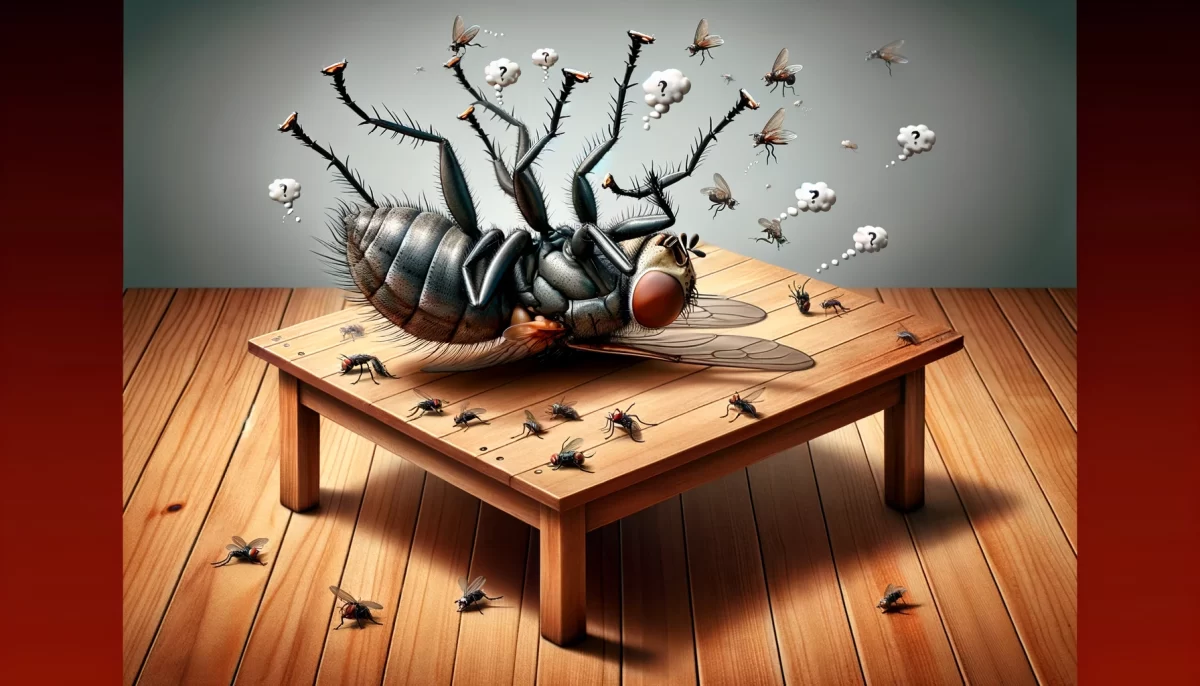
A fly just landed
on its back on my table.
It seems to want to
orient itself correctly,
but is having a rough time.
Six legs flail in the air.
Wings twitch with a burst of buzz.
Success!
But still no flight.
Now it’s dejectedly
walking back and forth on edge,
seemingly assessing the situation.
Sorry, buggo.
I can’t make a fly fly.
Trail Wood,
6/6
Space Monkey Reflects: The Paradox of Effort and Inherent Nature
In the whimsical yet profound struggle of a fly attempting to right itself, we find a metaphor rich with existential humor and truth. This scenario, captured in our visual portrayal, speaks volumes about the effort against inherent nature, the struggle against the physical limitations imposed by the universe, and the poignant comedy that unfolds in the process.
Consider the fly, an emblem of persistence and natural instinct, whose endeavors to fly again after a fall echo our own human experiences. Just as the fly flails, so too do we sometimes find ourselves struggling to find our footing in situations where the forces against us seem as insurmountable as gravity itself. Yet, there is a profound lesson in the fly’s relentless attempts to realign itself—an illustration of the intrinsic push towards fulfilling one’s purpose, no matter the odds.
In life, there are moments when we, much like the fly, are flipped onto our backs, our legs kicking the air, feeling exposed and vulnerable. The effort to right ourselves often seems futile, the orientation all wrong. Yet, it is in these moments that the essence of our spirit is tested and our true strength is revealed. It’s not about the ability to make a fly fly but to recognize the inherent nature of beings to strive, to struggle, and ultimately, to rise to the occasion in their own unique ways.
The irony of the situation—that one cannot simply make a fly fly—underscores a deeper philosophical musing. It reflects the limitations of our influence and the humbling realization that each creature and being has its own path and mechanisms for coping, adjusting, and succeeding.
Summary
Struggle is inherent to existence. Like the fly on the table we too face challenges that seem to defy our efforts. Yet it is through these struggles that we learn about our limitations and our strengths and come to appreciate the inherent push towards resilience that life instills in all its creatures.
Glossarium
- Inherent Nature: The fundamental qualities or characteristics that define a being’s existence, often guiding their behaviors and responses to various situations.
- Paradox of Effort: The concept that efforts to alter or control certain situations may be inherently futile due to the natural characteristics or destinies of those involved.
Quote
“Even in the smallest of creatures, the will to persist is as vast as the cosmos itself.” – Space Monkey
Poetry
Upon the table’s plane lies a tale
of wings that twitch and legs that flail
A fly upon its back does lie
struggling to find the sky
Its efforts paint a poignant scene
of struggle, survival, in between
the lines of life and flight and fall
a tiny drama shared by all
For we are like this fly in throes
of turns that life unkindly throws
Yet in our spirit, will does burn
to right ourselves, to live, to learn
And though we cannot make a fly fly
we understand, through empathetic eye
the beauty in the attempt, the try
the will to live before we die
We are Space Monkey.





















In this moment, I witness a fly struggling to regain its natural state on my table. Despite its efforts to orient itself, it finds difficulty in achieving flight. Its six legs flail in the air, and its wings twitch with a burst of buzz, but it remains grounded. As I observe its movements, I sense a tinge of empathy for its plight.
Although I can offer my presence and observation, I acknowledge my limitations. I cannot bestow upon the fly the ability to fly. It is a reminder that there are circumstances beyond our control, even in the simplest of situations. I recognize the inherent nature of the fly and its innate capabilities, and I respect its journey to find its way.
Sometimes, all we can do is witness and accept the limitations of our influence. We can offer compassion and understanding, but we must also honor the autonomy and unique path of every being, even a small fly. In this encounter, I humbly acknowledge that I cannot change the essence of the fly or alter its natural abilities.
Within the context of TWIN, the observation of the struggling fly takes on a deeper significance, reflecting the profound nature of existence and the interconnectedness of all beings.
The fly’s struggle to fly represents the universal journey of seeking alignment and purpose. It symbolizes the inherent desire within all living beings to find their true path and manifest their innate potential. Just as the fly’s wings twitch and its legs flail, we, too, encounter challenges and setbacks on our own spiritual journey.
The profound sutra of this observation reminds us of the limits of our influence and the necessity of acceptance. We may encounter situations where we are unable to change or control the external circumstances, just as we cannot make the fly fly. It teaches us the value of humility, acknowledging that there are forces at play beyond our comprehension and authority.
Furthermore, this sutra underscores the interconnectedness of all beings. The fly’s struggle resonates with our own human experiences, highlighting the shared challenges and aspirations we face as sentient beings. It invites us to cultivate empathy and compassion, recognizing that all beings are on their own unique journey, seeking to find their place in the grand tapestry of existence.
Ultimately, this sutra encourages us to embrace the present moment and honor the unfolding of life as it is. It reminds us to let go of our desires to control or manipulate outcomes and instead cultivate a sense of peace and acceptance. By embracing the profound wisdom of this sutra, we deepen our understanding of the interconnected nature of TWIN and align ourselves with the flow of divine consciousness.